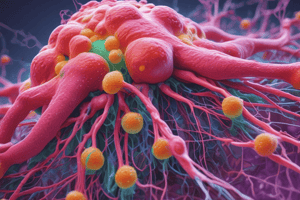Podcast
Questions and Answers
What is the primary function of the lymphatic system in the context of immune responses?
What is the primary function of the lymphatic system in the context of immune responses?
- To initiate immune responses by detecting microbial components and foreign antigens (correct)
- To eliminate microbial components and foreign antigens from the body
- To produce immune cells that fight against infections
- To regulate the body's temperature during immune responses
What type of cells line the lymphatic vessels?
What type of cells line the lymphatic vessels?
- Lymphocytes
- Macrophages
- Endothelial cells (correct)
- Dendritic cells
What is the primary function of the valves in lymphatic vessels?
What is the primary function of the valves in lymphatic vessels?
- To prevent backflow and ensure the unidirectional flow of lymph (correct)
- To produce immune cells that fight against infections
- To absorb excess interstitial fluid from the tissues
- To regulate the flow of lymphatic fluid
What is the main function of lymph nodes in the immune response?
What is the main function of lymph nodes in the immune response?
What is the function of the lymphatic system in maintaining fluid balance in the body?
What is the function of the lymphatic system in maintaining fluid balance in the body?
What is the primary role of the spleen in the lymphatic system?
What is the primary role of the spleen in the lymphatic system?
What is the main function of lymph nodes in the immune system?
What is the main function of lymph nodes in the immune system?
What is the primary function of the lymphatic system in maintaining fluid balance?
What is the primary function of the lymphatic system in maintaining fluid balance?
What is the role of the thymus in the lymphatic system?
What is the role of the thymus in the lymphatic system?
What is the primary function of the lymphatic vessels in the lymphatic system?
What is the primary function of the lymphatic vessels in the lymphatic system?
Flashcards are hidden until you start studying
Study Notes
Lymphatic System: Functions and Subtopics
The lymphatic system is a vital component of the human body, playing a crucial role in maintaining fluid balance, immune responses, and in the absorption of dietary fats. This article will explore the lymphatic system by discussing lymph nodes, lymphatic vessels, lymphatic organs, and the overall function of the lymphatic system in the context of the immune response.
Lymph Nodes
Lymph nodes are small, round, or oval-shaped structures found throughout the body, especially in the neck, armpits, groin, and along the blood vessels in the chest. They are part of the immune system and play a pivotal role in the initiation of immune responses by detecting microbial components and foreign antigens. Lymph nodes are composed of various types of immune cells, including lymphocytes, macrophages, and dendritic cells. The architecture of a lymph node is designed to facilitate efficient immune responses, with distinct zones like the medulla, paracortex, and cortex.
Lymphatic Vessels
Lymphatic vessels are a network of tubes that transport lymph, a colorless fluid, throughout the body. These vessels have a unique structure that allows them to absorb excess interstitial fluid from the tissues and return it to the intravascular space. Lymphatic vessels are lined with endothelial cells and are characterized by valves that prevent backflow, ensuring the unidirectional flow of lymph. The initial point of entry into the lymphatic system is through the capillaries, which have overlapping endothelial cells and intraluminal valves.
Lymphatic Organs
The lymphatic system includes several organs that contribute to its functions. The spleen, for example, is the largest lymphoid organ and plays a role in immune responses and in filtering the blood. The thymus is another lymphatic organ that is involved in the development of immune cells, particularly T cells.
Lymphatic System Function
The lymphatic system has three primary functions: maintaining fluid balance, facilitating the absorption of dietary fats, and enhancing the immune system. It does this by transporting lymph throughout the body, which provides a pathway for immune cells to circulate and reach sites of infection. The lymphatic system is also involved in maintaining fluid balance by reabsorbing interstitial fluid from the periphery.
Immune Response
Lymph nodes are a key part of the immune system, as they are the site where immune cells, such as lymphocytes and macrophages, interact and activate to combat infections. The lymphatic system allows for the immune system to function properly by carrying antigens to lymph nodes and transporting immune cells to sites of infection.
In conclusion, the lymphatic system is a vital component of the circulatory, immune, and metabolic systems. It plays a crucial role in maintaining fluid balance, facilitating the absorption of dietary fats, and enhancing the immune system. The lymphatic system is composed of a network of vessels, nodes, and ducts that collect and circulate excess fluid in the body, and it is essential for immune system regulation. Understanding the functions and subtopics of the lymphatic system can provide valuable insights into its importance in maintaining overall health and well-being.
Studying That Suits You
Use AI to generate personalized quizzes and flashcards to suit your learning preferences.




